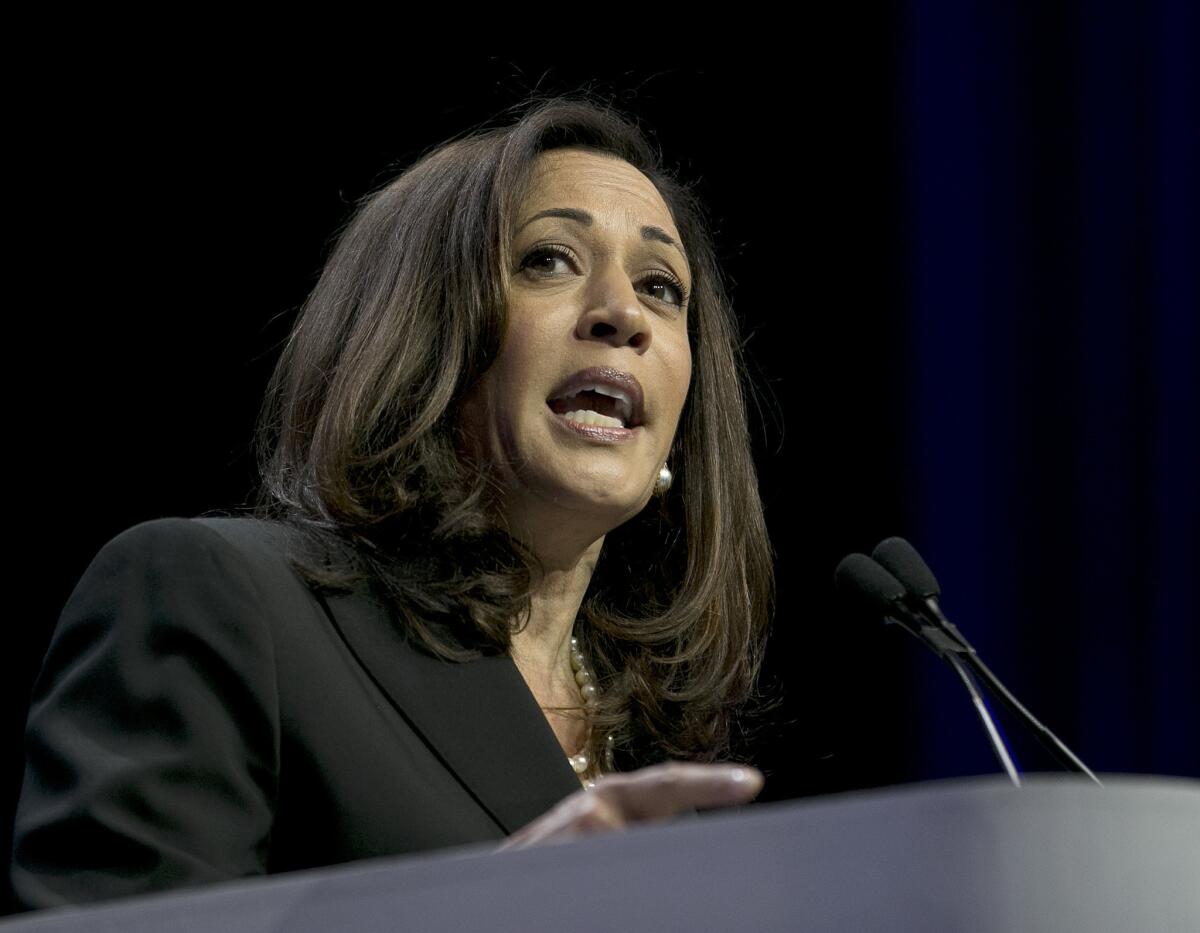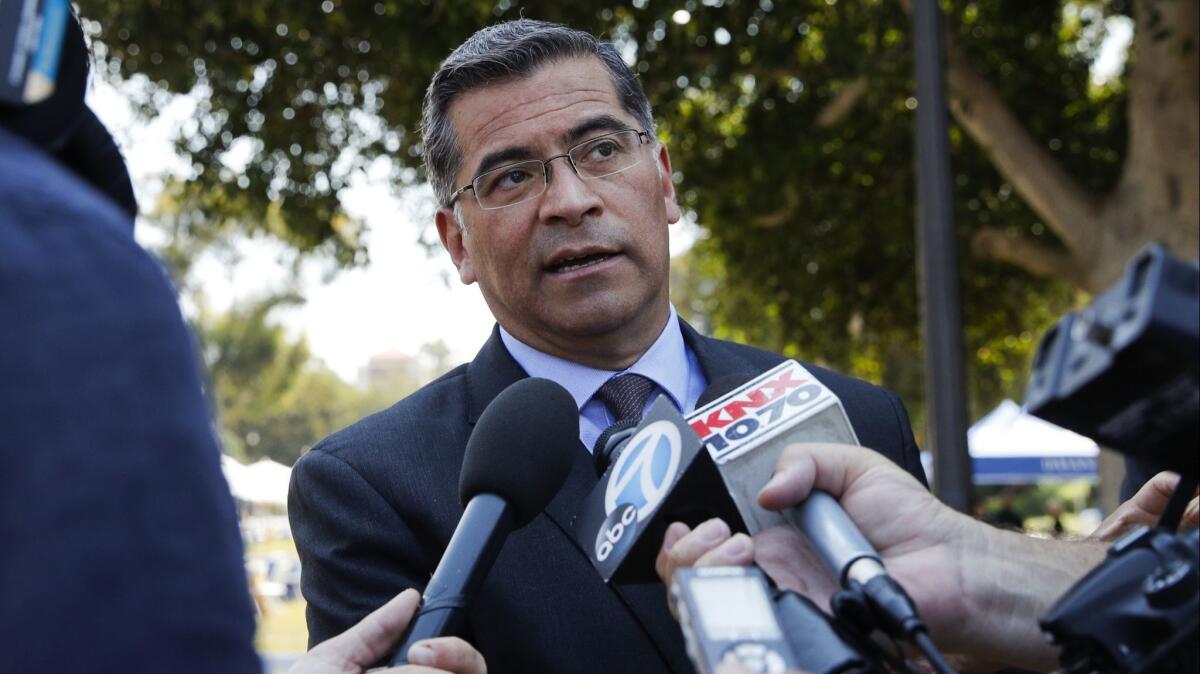How a major investigation into Orange County jail informants ended with a whimper

When former California Atty. Gen. Kamala Harris in 2015 launched a criminal investigation into corruption inside Orange County’s jails, local activists and attorneys hoped it would finally reveal the breadth of a scandal that engulfed the Sheriff’s Department and district attorney’s office — and may have affected countless court cases.
Four years later — after an investigation into the misuse of informants inside the county’s jails came to an anticlimactic end in a Santa Ana courtroom with no explanation and no charges filed — those same advocates were left asking a much simpler question: What happened?
For the record:
8:23 p.m. Jan. 20, 2020A previous version of this story misidentified an Orange County sheriff’s deputy who resigned in March. The deputy is William Grover.
Though the scandal sparked a U.S. Department of Justice investigation and led to retrials for dozens of defendants, including convicted murderers, the unexplained conclusion of the state inquiry has stirred frustration that many key players will escape accountability.
Harris’ successor, Atty. Gen. Xavier Becerra, has refused to discuss specifics about the inquiry or explain how a perjury investigation came up empty even after a Superior Court judge ruled that two deputies “intentionally lied or willfully withheld material evidence” about the misuse of informants at a murder trial.
But in the months since the inquiry’s end, law enforcement leaders in Orange County and attorneys involved in cases tied to the scandal have agreed to speak out about the tactics used by state investigators during the four-year review, raising serious questions about how thorough the attorney general’s office was.
From 2015 to 2019, only four Sheriff’s Department employees were interviewed as part of the investigation, according to Orange County Sheriff Don Barnes. The three deputies who were the focus of both the attorney general’s investigation and the Sheriff’s Department’s internal inquiry were not among those interviewed, Orange County Assistant Public Defender Scott Sanders said.
For at least the first two years of the inquiry, witnesses were subpoenaed or compelled to testify, according to an official with knowledge of the investigation who spoke on the condition of anonymity in order to discuss the case candidly.
Even the length of the investigation has been called into question. Although the public was not made aware of the investigation’s end until April 2019, Barnes said the Sheriff’s Department stopped receiving requests for interviews or documents in early 2017. Sanders, who based his comments on court documents detailing the investigation that he reviewed as part of a criminal trial, said there are no records indicating that the investigation carried on past late 2016. Becerra succeeded Harris in 2017.
“It’s been pretty hard to sit here watching them pretend like they had an ongoing investigation when they were done in 2016,” Sanders said. “All of them knew. It’s not like Sen. Harris didn’t know. It’s not like Becerra didn’t know they were perpetuating a scam. There was no reason not to tell us the investigation was over, but they clearly did not want to deal with questions about why they did and didn’t do certain things.”
Sanders — the public defender who first uncovered evidence of the Sheriff’s Department’s problematic use of informants — has not disclosed this information previously. He declined to allow a Times’ reporter to review the documents or provide copies.
Sanders was given voluminous records related to the attorney general’s investigation as part of the discovery he received during hearings in connection to murder charges against Scott Dekraai, the gunman in the 2011 Seal Beach salon massacre. Dekraai’s case became central to the informant scandal when it was revealed the Sheriff’s Department had housed a prolific snitch near him hoping to elicit a confession.
The revelation was one of several that led to accusations that deputies housed a network of informants next to inmates to question them about crimes for which they had already been charged, a clear violation of their constitutional right to have an attorney present.
More than a dozen defendants received retrials after the scandal was exposed, including some convicted of grisly murders such as the 1998 slaying of a woman who was eight months pregnant when her body was dumped into the Long Beach harbor.
Dekraai was spared the death penalty. Orange County Superior Court Judge Thomas Goethals ruled that the defendant could never truly receive a fair trial, citing the Sheriff’s Department’s repeated failure to turn over evidence about the scandal.
In 2017, Dekraai was sentenced to life in prison without the possibility of parole in the deaths of eight people at Salon Meritage. He had pleaded guilty to the crimes in 2014.
The district attorney’s office and Sheriff’s Department denied running an illegal informant program, but a judge removed county prosecutors from the Dekraai case in 2015, handing its prosecution to the attorney general.
The documents concerning the state investigation were filed under seal, but Sanders agreed to give a general description of their contents in an interview with The Times because the review had ended and Dekraai cannot appeal his case under the terms of his plea.

Based on what he saw in the court documents, Sanders described the investigation as weak.
“It was just striking ... it was really, clearly, not a hard and penetrating investigation determined to get to the truth about what happened. You couldn’t read this and say these folks were really trying to get to the bottom of this. It was softballs and little follow-up,” he said. “You would have never examined these materials and decided the A.G.’s office was trying to put any sheriff’s deputies in harm’s way.”
Gerald Engler, the assistant attorney general in charge of criminal investigations, referred questions to the California Department of Justice’s press office, which declined to comment for this story. At news conferences last year, Becerra himself evaded questions about the way the case was handled.
Harris, whose bumpy presidential campaign ended last month, declined an interview request from The Times. In a statement, Harris’ press secretary Meaghan Lynch called the Sheriff’s Department’s handing of informants “disturbing” and said Harris believed the investigation would continue after she left office.
“While [Sen. Harris] shared others’ frustrations that a thorough investigation could not be completed more quickly, the investigation was ongoing and still underway when she left the Attorney General’s office and became senator,” the statement said.
Harris’ criminal justice record was a thorn in her presidential bid. While she touted her prosecutorial past as an asset in challenging President Trump, critics said her close ties to law enforcement put her out of step with a Democratic primary electorate seeking reform and police accountability.
In fact, it has been the Trump administration’s Justice Department — which has otherwise come under criticism for cutting back on federal reviews of law enforcement misconduct — that has continued to investigate informant misuse in Orange County. Last year, Dist. Atty. Todd Spitzer told The Times that federal investigators had requested more than 100 case files and thousands of pages of documents related to trials that are more than 2 decades old as it continues to review the issue.
Sanders said he believed Harris’ habit of shying away from pursuing misconduct cases against law enforcement played a role in what he saw as an inept investigation in Orange County.
“Three deputies committed blatant perjury in a death penalty case,” he said. “The Harris administration had everything it needed to prosecute for perjury, except for the courage to stand up to law enforcement.”
An official with knowledge of Harris’ thinking said the investigation was stalled by intensive document review and the fact that “principal key witnesses” could not be interviewed, referring to the three deputies who later became the focus of the Sheriff’s Department’s internal investigation. Her office did not make an attempt to compel or subpoena witnesses to testify, said the official, who spoke on the condition of anonymity in order to discuss the case candidly.
The official was not sure whether the deputies refused to be interviewed, and disputed characterizations that the investigation was largely completed before Harris left office.
“When she left, no one was saying, ‘All right, the investigation’s done,’” the official said.
Barnes, who was an assistant sheriff at the time, said the attorney general’s office stopped requesting interviews or documents in early 2017, shortly after Becerra took office.
“It got to the point where we were asking for updates, and there was no response,” he said. “It didn’t seem like there was any work being done, but there was also no finality to it.”

Assistant Sheriff Bill Baker, who formerly served as a captain overseeing the county’s central jail complex and took part in the search for the log of jailhouse informant movements years earlier, confirmed that he was interviewed, but the Sheriff’s Department declined to identify any other personnel who spoke with the attorney general’s office. The relatively small number of personnel interviewed drew scrutiny from some law enforcement experts.
“You would think, given the allegations about how widespread this practice was in the jails, that there would be more witnesses that you would want to call in that investigation,” said Richard Drooyan, a former federal prosecutor who served as the court-appointed monitor over reforms in L.A. County’s jails.
The state investigation, however, seemed focused on possible perjury charges against several deputies who testified at Dekraai’s trial, according to the Harris official. In 2015, former Orange County Dist. Atty. Tony Rackauckas sent a letter to the attorney general’s office requesting criminal investigations into Deputies Seth Tunstall and Ben Garcia, citing a judge’s conclusion that the two men were probably not truthful when they delivered testimony during the murder trial.
But the Harris official said state investigators were severely hamstrung by the deputies’ refusal to speak with them.
“In order to prove perjury, you needed to know or establish exactly what the sheriff’s deputies knew when they testified, and that was one of the many reasons why it was important, or would have been helpful, to actually interview them, which of course didn’t happen,” the official said.
Tunstall and a third deputy under investigation, William Grover, resigned in March, the Sheriff’s Department said.
A second letter sent by Rackauckas in 2018, which was obtained by The Times through a public records request, also suggests the state investigation had been closed earlier than previously known.
He sent the letter to Barnes and then-Sheriff Sandra Hutchens to inform them he would not be adding any deputies linked to the snitch scandal to the office’s so-called Brady list, referring to the U.S. Supreme Court ruling requiring the disclosure of potentially exculpatory evidence to a defendant, including names of law enforcement officers whose testimony might be deemed unreliable.
In the letter, Rackauckas said that his decision was “unaffected by the Attorney General’s investigation and decision not to pursue criminal actions” against any deputies. Rackauckas did not respond to requests for comment.
Sanders believes the failed state investigation will serve as a missed opportunity to curb future misconduct.
“When you do an investigation like this and it’s not done in good faith and it’s not responsibly done, members of law enforcement just become more dangerous in terms of their willingness to commit misconduct,” he said. “The last line of protection for the public was the attorney general’s office.”
More to Read
Start your day right
Sign up for Essential California for news, features and recommendations from the L.A. Times and beyond in your inbox six days a week.
You may occasionally receive promotional content from the Los Angeles Times.








